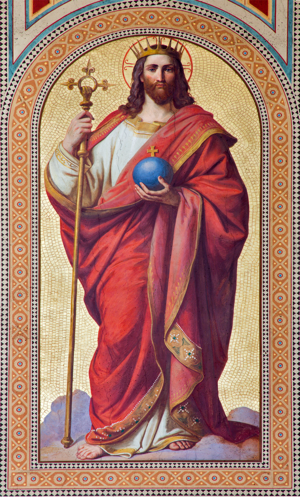
By means of his encyclical letter “Quas primas,” promulgated in 1925, Pope Pius XI instituted the feast of Christ the King, to be celebrated in the Roman Rite as the last Sunday of the month of October, meaning the Sunday that immediately precedes the Feast of All Saints. In 1960, Pope John XXIII simplified the Roman Rite liturgical calendar, establishing Christ the King as “a feast of the first class,” or a feast that outranks others if there’s conflict within the liturgical calendar. The Extraordinary Form of the Roman Rite — implemented at All Saints in Minneapolis, for example — continues to observe this feast according to these rubrics.
But by means of the apostolic letter “Mysterii Paschalis,” issued in 1969, Pope Paul VI changed the title of the feast to “Our Lord Jesus Christ, King of the Universe,” shifted its observance to the last (34th) Sunday in Ordinary Time (meaning the Sunday immediately before the First Sunday of Advent of the new liturgical year), and gave it the rank of “solemnity,” as the Ordinary Form of the Roman Rite celebrates it today.
It should be clear that in both the Extraordinary and Ordinary Forms of the Roman Rite, the connection of the feast to All Saints or the First Sunday of Advent gives it a strong eschatological emphasis.
Citing St. Cyril of Alexandria, Pius XI adduces three reasons that the Church proclaims the universal sovereignty of Christ:
From the hypostatic union: “[T]he Word of God, as consubstantial with the Father, has all things in common with him, and therefore has necessarily supreme and absolute dominion over all things created.”
From his role as Redeemer: “Christ is also King by acquired, as well as by natural right, for he is our Redeemer.” Christ has purchased us at a great price and our very bodies are “his members” according to “Quas primas.”
From the will of God the Father, as Matthew 28:18 records: “All power in heaven and on earth has been given to me.”
The lectionary selections for this solemnity in Year B of the Ordinary Form of the Roman Rite highlight the universal sovereignty of Christ, the revelation of that sovereignty at the end of time, and the contrast between this world’s notions of sovereignty and those of Christ.
Daniel 7:13-14 and the day’s responsorial psalm employ enthronement imagery to emphasize the cosmic significance of Christ’s power and authority, with “One like a Son of Man” (i.e., Christ) presented to the “Ancient One” (i.e., God the Father) receiving “dominion, glory and kingship.” Christ’s sovereignty extends over all humanity (“all peoples, nations and languages”) and all time (“an everlasting dominion”).
Revelation 1:5-8 forms part of the opening formula prefixed to the “Inaugural Vision and Letters to the Seven Churches” that forms an early unit of the Book of Revelation. Our passage omits the triadic description of God (the Father?) and the “seven spirits” (Holy Spirit?) in Revelation 1:4 to concentrate on the triadic description of Christ as “faithful witness” (connecting to his ministry, passion and death), as “first born of the dead” (connecting to his resurrection) and as “ruler of the kings of the earth” (connecting to his exaltation and the “Parousia,” “when every eye will see him.”)
Finally, John 18:33b-37 presents the clash of perspectives between Pilate, the Roman puppet who cynically asks, “What is truth?” (Jn 18:38), and Jesus the self-sacrificing Messiah, who declares that the role of the king in the reign of God he imagines and embodies is “to testify to the truth.” And the truth is that the kingdom Christ preaches and manifests “does not belong to this world” with its anger and violence, but nevertheless that Christ is truly a king.
“Quas primas” provides a powerful application of the meaning of this feast for our practice as believers: “[Christ] must reign in our minds, which should assent with perfect submission and firm belief to revealed truths and to the doctrines of Christ. He must reign in our wills, which should obey the laws and precepts of God. He must reign in our hearts, which should spurn natural desires and love God above all things, and cleave to him alone. He must reign in our bodies and in our members, which should serve as instruments for the interior sanctification of our souls, or to use the words of the Apostle Paul, as instruments of justice unto God.”
Father Joncas, a composer, is an artist in residence at the University of St. Thomas in St. Paul.
Sunday, Nov. 25
Solemnity of Our Lord Jesus Christ, King of the Universe



